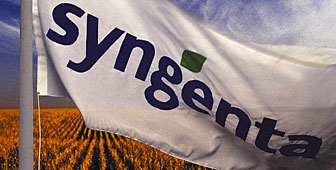Environmentalists urge pesticide ban

Environmentalists have called on Swiss agri-chemical giant Syngenta to phase out global production of a pesticide blamed for killing poor farmers.
The Berne Declaration, a non-governmental group in favour of sustainable development, on Monday called for bans on Paraquat – a pesticide used to kill weeds in more than 100 countries.
The call came one day ahead of Syngenta’s first annual general meeting. The Basel-based company is one of the world’s largest agri-chemical firms, and was formed last year partially from a division of pharmaceutical producer Novartis.
The Berne Declaration – alongside four other international public interest groups – said it was time to halt use Gramoxon, Syngenta’s commercial name for Paraquat, because the pesticide was causing loss of life around the world.
The claims were rejected by Syngenta, which accused the Berne Declaration of unfairly blaming Paraquat for fatalities caused by other chemicals.
Paraquat has been used for more than 40 years to control weeds, mostly on farms growing bananas, palm-oil trees, coffee, cotton, rubber and fruit. The company says it earns SFr680 million ($411.6 million) per year from Gramoxon and similar products.
European bans
François Meienberg, a spokesman for the Berne Declaration, said the sale of Gramaxone undermined Syngenta’s claim to be a responsible and socially aware business.
Meienberg said most victims of the pesticide were poor farmers in developing countries, where controls on the use of the spray were limited. Farmers were often exposed to the chemical because of “leaking knapsacks, spray drift, and [by] walking through sprayed vegetation”.
“There are several European countries that have banned this product…not only because of health effects, but also because they fear environmental effects on animals and the soil,” Meienberg told swissinfo.
“[Therefore] it’s very clear, if a country like Sweden with good standards of control and health law should ban this product, [then] countries like Malaysia, China or Indonesia should do the same, because they are not able to guarantee the safe use as would be possible in Sweden,” he said.
“Too many deaths”
Meienberg said the Berne Declaration had released a study entitled “Poisoned and Silenced – a study of Pesticide Poisoning in the Plantation” highlighting the impacts of the chemical on workers.
In Costa Rica, for instance, where workers spread a yearly equivalent of 65 kilos of pesticide each, poisonings are common.
“A lot – and that means too many people – are still dying,” Meienberg said.
“Workers who work in plantations who use Gramoxone on a daily basis, spraying this pesticide, have severe health effects. [They] start with headaches, and with burns of the skin and loss of nails, and end with cancer and death.
“It’s not tolerable anymore for a company like Syngenta, who [describe] themselves as a leading agri-chemical company with high social standards, to produce a product with this impact.”
False claims
But George Diriwaechter, a spokesman for Syngenta, said the Berne Declaration was using unreliable research to make claims about a product that did no harm to the environment.
Diriwaechter said the pesticide, when used according to its instructions, was “absolutely safe”.
“We know there is misuse of Paraquat, which is why we have product stewardship programs, such as in Malaysia [where we] work together with plantations. There are also programs for small farmers to train them in how to use the products,” he said.
He also said a number of countries had banned the product because it was being used as a method of suicide.
by Jacob Greber

In compliance with the JTI standards
More: SWI swissinfo.ch certified by the Journalism Trust Initiative
You can find an overview of ongoing debates with our journalists here. Please join us!
If you want to start a conversation about a topic raised in this article or want to report factual errors, email us at english@swissinfo.ch.